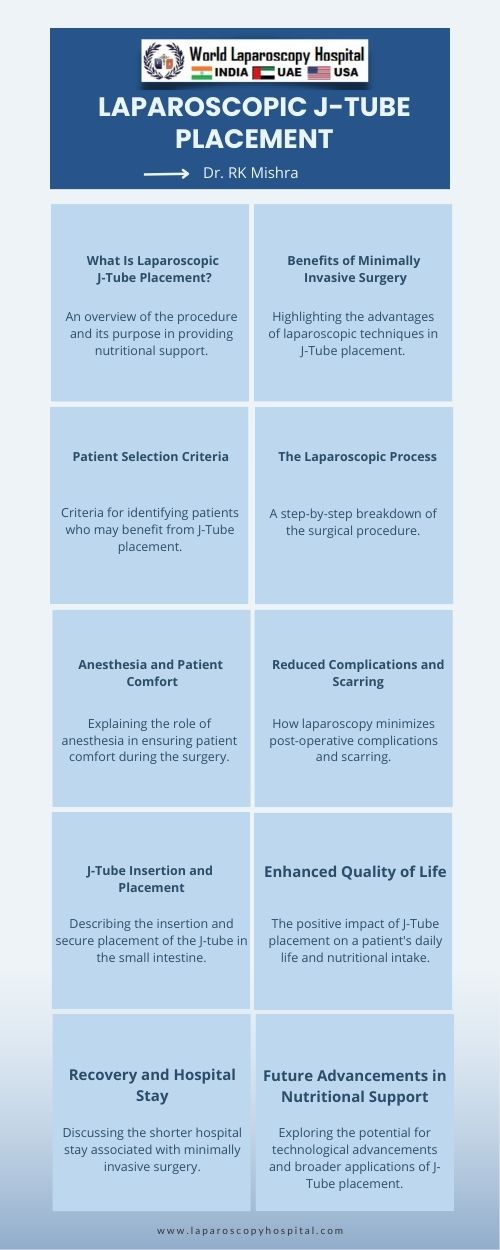Introduction:
In the realm of modern medicine, minimally invasive surgical techniques have been a game-changer, enabling surgeons to perform complex procedures with precision and reduced patient discomfort. Laparoscopic J-Tube placement is a prime example of this surgical innovation, offering a less invasive approach to providing essential nutritional support to individuals who need it most. This article explores the intricacies of Laparoscopic J-Tube Placement, its significance in medical practice, the surgical procedure itself, patient benefits, and future prospects.

Section 1: Understanding the Significance
Laparoscopic J-Tube Placement involves the insertion of a Jejunostomy tube, commonly known as a J-tube, into the small intestine through a minimally invasive procedure. This surgical technique has gained significant importance due to its various advantages:
1.1 Enhanced Nutritional Support:
- Laparoscopic J-Tube Placement is primarily employed in patients who are unable to consume adequate nutrition orally. It serves as a lifeline for individuals with conditions such as severe dysphagia, gastroparesis, or those recovering from major surgeries where oral intake is restricted.
1.2 Minimized Complications:
- Unlike traditional open surgical techniques, laparoscopic procedures reduce the risk of post-operative complications, minimize scarring, and promote faster recovery.
Section 2: The Surgical Procedure
2.1 Patient Preparation:
- The patient is typically placed under general anesthesia to ensure comfort during the procedure.
- Small incisions are made in the abdominal area to allow the insertion of laparoscopic instruments.
2.2 Trocar Placement:
- Trocars, specialized tubes, are inserted through these incisions to create access points for the laparoscopic camera and surgical tools.
- The surgeon monitors the procedure through the camera and controls the instruments.
2.3 J-Tube Insertion:
- A small incision is made in the abdominal wall, and the J-tube is inserted through this incision.
- The tube is carefully guided into the small intestine and secured in place.
Section 3: Patient Benefits
3.1 Improved Quality of Life:
- Laparoscopic J-Tube Placement significantly enhances the quality of life for patients who rely on enteral feeding. It ensures a consistent supply of nutrition, vitamins, and medications.
3.2 Reduced Hospital Stay:
- Minimally invasive procedures often result in shorter hospital stays, allowing patients to return to their daily lives sooner.
Section 4: Future Prospects
4.1 Technological Advancements:
- Continuous advancements in laparoscopic instruments and techniques promise further improvements in the safety and efficacy of Laparoscopic J-Tube Placement.
4.2 Expanding Indications:
- As the understanding of nutritional support grows, the indications for J-Tube placement may expand to include a wider range of patients with different medical conditions.
Conclusion:
Laparoscopic J-Tube Placement represents a remarkable advancement in the field of surgery, offering a minimally invasive solution to provide essential nutrition to patients in need. With its numerous benefits, this procedure has transformed the lives of individuals who were once dependent on other forms of nutritional support. As technology continues to advance, we can anticipate even greater refinements in the technique and its broader application in medical practice. The future of nutritional support looks brighter than ever, thanks to Laparoscopic J-Tube Placement.